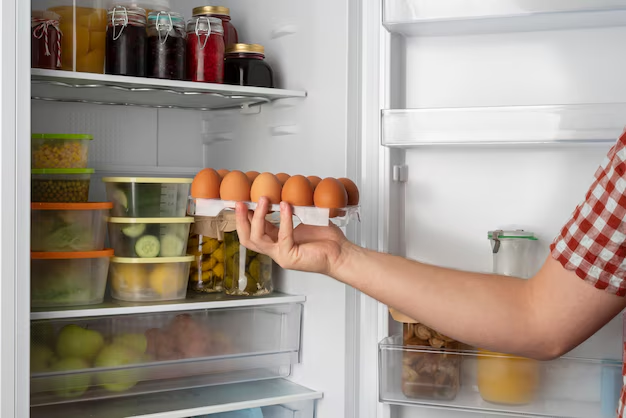Can Hiding in a Refrigerator Save You From a Nuclear Blast?
Imagine you're watching an action-packed film, and suddenly, there's a nuclear explosion. Our protagonist miraculously jumps into an old refrigerator, surviving the catastrophic blast without a scratch. While it makes for thrilling cinema, can a refrigerator actually save you from a nuclear blast in reality? Let's dive into the science, myths, and survival strategies to find out.
The Origins of the Myth
This idea gained popularity from a famous movie scene where a character survives a nuclear explosion by hiding in a lead-lined refrigerator. But is there any truth to this cinematic escape plan?
Understanding Nuclear Explosions
To evaluate the possibility, it’s crucial to grasp the devastating power of nuclear explosions. These blasts release massive amounts of energy, causing destruction through:
- Blast wave: immense pressure that levels everything in its path.
- Thermal radiation: intense heat that can cause fires and severe burns.
- Radiation: a torrent of harmful particles and waves.
- Electromagnetic pulse (EMP): which can disrupt electronic devices.
Given these elements, it's clear that the threat from a nuclear explosion is multifaceted.
The Reality of Refrigerator Safety
Structural Considerations
Refrigerators are designed to keep food cool and hermetically sealed, not to withstand extreme external pressures or forces. While their metallic shell offers some protection, it’s minimal against a nuclear blast's magnitude.
- Metal shell: Too thin to stop radiation or withstand intense heat.
- Insulation: Useful for temperature regulation, not shielding against radiation.
- Design: Not structurally fortified like a bomb shelter or bunker.
Radiation Protection Myths
A widely held misconception is that metals can protect against radiation. While it's true that lead can block certain types of radiation, a household refrigerator's thin metal layer isn’t adequate.
- Radiation types: Alpha, beta, and gamma are the primary nuclear explosion radiation types. A fridge cannot stop these effectively.
- Lead lining: Requiring significant thickness to stop gamma rays, not present in typical refrigerators.
Effects of a Blast
The refrigerator might offer momentary protection from initial debris in a minor blast zone. However, surviving the primary and secondary effects like radiation and fire remains highly unlikely.
Practical Nuclear Survival Strategies
Building a Survival Plan
While refrigerators are ineffective, there are viable strategies to increase survival odds during a nuclear event.
Evacuation and Relocation
- Evacuation routes: Know your area's designated escape routes to safe zones.
- Emergency kits: Prepare bags with essentials like water, food, and medical supplies.
Shelter Building
- Fallout shelters: Consider constructing a dedicated fallout shelter in your home.
- Basement hideouts: Use a basement with reinforced ceilings as a temporary shelter.
Staying Informed
- Alerts: Sign up for local government alerts concerning nuclear threats.
- Communication devices: Have battery-powered radios to stay updated on news.
Immediate Actions Post-Explosion
- Seek shelter immediately: Time is of the essence during a nuclear event. Head for the most protected place you can find.
- Stay indoors: Thick walls increase protection against radiation.
- Seal your environment: Blocking windows and ventilation can reduce radioactive dust entering indoor spaces.
- Monitor news: Wait until it’s officially declared safe before venturing outdoors.
Psychological Preparedness
A significant part of survival includes mental readiness. Having a clear understanding and being mentally prepared can help navigate the stress of potential nuclear exposure.
- Regular drills: Conducting personal or family drills enforces readiness.
- Knowledge refresh: Keep data on nuclear safety up to date and accessible.
- Community plans: Participate in local safety programs for updates and assistance.
Summary of Key Takeaways
- 🚫 Fridges aren't effective shelters: They lack protection from radiation and structural integrity.
- 🏠 Build better shelters: Invest in sturdy fallout shelters or use your basement effectively.
- 📡 Stay informed: Use reliable channels for nuclear alerts and guidance.
- 🧘♀️ Mental fortitude is crucial: Calmness and preparation enhance response efficiency.
- 🛠 Utilize safety gear: Tools and protective wear improve self-protection capabilities.
Closing Insight
While popular culture often bends reality for entertainment, it’s critical to differentiate fiction from fact, especially regarding survival tactics. The key to nuclear explosion survival is preparation, awareness, and using scientifically proven methods, not relying on cinematic stunts like using a refrigerator as a shelter. Prepare adequately, stay informed, and prioritize safety measures established by expert consensus for the best chance of protection in such a dire event.

